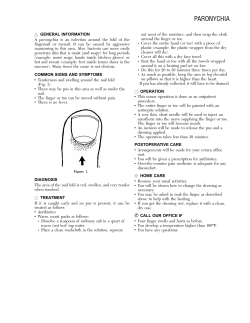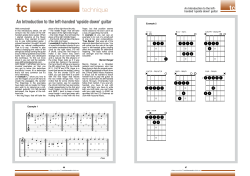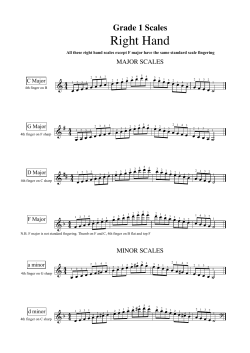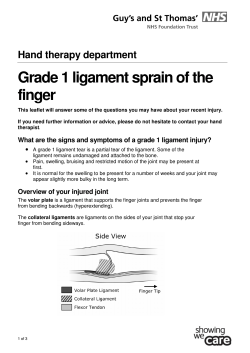
MALLET DEFORMITY HAND THERAPY CARE LEAFLET Information Leaflet
MALLET DEFORMITY HAND THERAPY CARE LEAFLET Information Leaflet Your Health. Our Priority. www.stockport.nhs.uk Outpatient Therapies | Stepping Hill Hospital Page 2 of 8 What is a mallet deformity? A mallet deformity is where the end joint of the finger bends down towards the palm and cannot be straightened. It can occur in a number of ways. The most common is when a straight finger is stubbed and forced to bend suddenly at the joint near the tip. As a result you can no longer straighten the finger at this joint except by lifting it with your other hand. The finger adopts a dropped or mallet position. This occurs when the tendon snaps. Occasionally a flake of bone may have been pulled off where the tendon should be attached. An x-ray, if taken, will show this. Typical mallet drop Typical mallet Bony mallet In either case without the use of the tendon the finger will remain bent. What are the signs and symptoms? - Pain Swelling Inability to straighten the end joint of the finger www.stockport.nhs.uk Outpatient Therapies | Stepping Hill Hospital Page 3 of 8 How can hand therapy help treat this? Your finger will be placed in a plastic splint to keep it straight. The plastic splint is then worn constantly for 6 - 8 weeks to keep the finger straight and the tendon ends together. Ideally, the splint must be worn all the time – day and night. This allows the two ends of the torn tendon or bone to stay together and heal. Without the splint the finger drops, creating a large gap in the tendon. This leads to a slack repair and the finger remains in the dropped position. Below is a step by step guide how to self-manage the splint. Your hand therapist will go through this with you. It is possible you will need to change your splint/clean your finger/dry your finger if it gets wet. These are the items you will require to manage your splint. They will be provided by your hand therapist. You will need to cut four pieces of tape. Two will need to be 5cm and two will need to be 10cm. If the splint is off, your finger tip must be supported in a straightened position at all times. Place it on the gauze which has been cut to size i.e. just wider than the width of your finger www.stockport.nhs.uk Outpatient Therapies | Stepping Hill Hospital Page 4 of 8 Pull the gauze back on its self with your other hand, so the finger and nail are covered. Keep the tip of your finger flat on the table. Slide the splint underneath until the tip touches the end of the splint. Using some scissors, trim the ends of the gauze (top and bottom) so it’s flush with the ends of the splint. You may need to get someone to do this for you. At the base of the splint use the first piece of short tape and firmly wrap it round to secure it to the finger. www.stockport.nhs.uk Outpatient Therapies | Stepping Hill Hospital Page 5 of 8 It should look like this when finished. With the first piece of long tape secure it to the base of the finger at one side. Bring it round the front or the back and secure it to the first piece of tape. It should look like this when finished. With the second piece of long tape secure it to the base of the finger but on the opposite side to the first piece. Bring it round the front or back and secure it to the first piece of tape. It should look like this when finished. www.stockport.nhs.uk Outpatient Therapies | Stepping Hill Hospital Page 6 of 8 With the final piece of short tape secure it over the middle or bottom of the finger to secure the tape just applied. It should look like this when finished. Cut the gauze away so the nail/finger tip is visible. This is so you can keep an eye on the nail and colour of the skin. Bend the finger to check the tape is secure. You should be able to bend the middle joint freely. You may feel a slight movement at the tip of the finger in the splint. Treatment is most likely to succeed if the splint is: www.stockport.nhs.uk Outpatient Therapies | Stepping Hill Hospital Page 7 of 8 1. 2. 3. 4. Worn constantly for 6 - 8 weeks. Always taped securely in place. Extra care is taken when changing the splint not to let the fingertip drop. Keep it dry. Frequently asked questions? What should I do as I work in a wet / dirty environment? If your hands are constantly exposed to very wet or very dirty conditions you should try to protect them by wearing gloves. Will my other finger joints start to get stiff and sore? The splint is designed to interfere as little as possible with normal use of your hand. Normal use will prevent stiffness of the uninjured parts of your finger and the rest of your hand. What should I do if the splint becomes loose or painful? Contact the department who fitted the splint. You may need a different size or a custom made splint. What happens after the splint is removed? Your finger may be stiff so you will be given some exercises to do. Will I need to wear the splint after 8 weeks? If the tendon has healed you may just need to wear the splint at night or at work for a further 4 weeks. You may also be offered some soft splints for a short period. What should I do if the splint gets wet or becomes damp? Our advice is to dry it with a hairdryer on a low / cool setting, being careful not to burn yourself. Or remove the splint, then keeping your finger straight, dry the finger and re-splint. Contact us Please contact us using any of the below details should you need any assistance or have any queries. Hand Therapy Team Outpatient Therapy Department Stepping Hill Hospital Poplar Grove, Stockport SK2 7JE. 0161 419 4068 Physiotherapy.Team@stockport.nhs.uk www.stockport.nhs.uk Outpatient Therapies | Stepping Hill Hospital Page 8 of 8 If you would like this leaflet in a different format, for example, in large print, or on audiotape, or for people with learning disabilities, please contact: Patient and Customer Services, Poplar Suite, Stepping Hill Hospital. Tel: 0161 419 5678 Information Leaflet. Email: PCS@stockport.nhs.uk. Our smoke free policy Smoking is not allowed anywhere on our sites. Please read our leaflet 'Policy on Smoke Free NHS Premises' to find out more. Leaflet number Publication date Review date Department Location www.stockport.nhs.uk OUT27 March 2013 March 2015 Outpatient Therapies Stepping Hill Hospital Outpatient Therapies | Stepping Hill Hospital
© Copyright 2025











